中国传统节日英文介绍
介绍中国传统节日的英语作文10篇
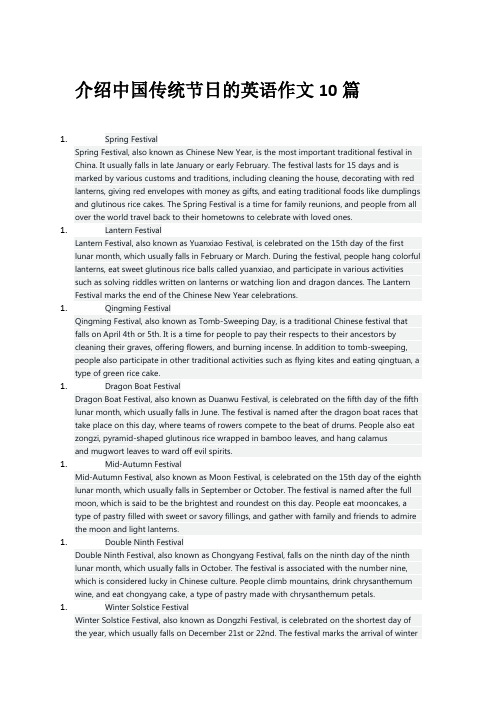
介绍中国传统节日的英语作文10篇1.Spring FestivalSpring Festival, also known as Chinese New Year, is the most important traditional festival in China. It usually falls in late January or early February. The festival lasts for 15 days and ismarked by various customs and traditions, including cleaning the house, decorating with red lanterns, giving red envelopes with money as gifts, and eating traditional foods like dumplings and glutinous rice cakes. The Spring Festival is a time for family reunions, and people from all over the world travel back to their hometowns to celebrate with loved ones.ntern FestivalLantern Festival, also known as Yuanxiao Festival, is celebrated on the 15th day of the first lunar month, which usually falls in February or March. During the festival, people hang colorful lanterns, eat sweet glutinous rice balls called yuanxiao, and participate in various activities such as solving riddles written on lanterns or watching lion and dragon dances. The Lantern Festival marks the end of the Chinese New Year celebrations.1.Qingming FestivalQingming Festival, also known as Tomb-Sweeping Day, is a traditional Chinese festival that falls on April 4th or 5th. It is a time for people to pay their respects to their ancestors bycleaning their graves, offering flowers, and burning incense. In addition to tomb-sweeping, people also participate in other traditional activities such as flying kites and eating qingtuan, a type of green rice cake.1.Dragon Boat FestivalDragon Boat Festival, also known as Duanwu Festival, is celebrated on the fifth day of the fifth lunar month, which usually falls in June. The festival is named after the dragon boat races that take place on this day, where teams of rowers compete to the beat of drums. People also eat zongzi, pyramid-shaped glutinous rice wrapped in bamboo leaves, and hang calamusand mugwort leaves to ward off evil spirits.1.Mid-Autumn FestivalMid-Autumn Festival, also known as Moon Festival, is celebrated on the 15th day of the eighth lunar month, which usually falls in September or October. The festival is named after the full moon, which is said to be the brightest and roundest on this day. People eat mooncakes, a type of pastry filled with sweet or savory fillings, and gather with family and friends to admire the moon and light lanterns.1.Double Ninth FestivalDouble Ninth Festival, also known as Chongyang Festival, falls on the ninth day of the ninth lunar month, which usually falls in October. The festival is associated with the number nine, which is considered lucky in Chinese culture. People climb mountains, drink chrysanthemum wine, and eat chongyang cake, a type of pastry made with chrysanthemum petals.1.Winter Solstice FestivalWinter Solstice Festival, also known as Dongzhi Festival, is celebrated on the shortest day of the year, which usually falls on December 21st or 22nd. The festival marks the arrival of winterand the beginning of longer days. People eat tangyuan, glutinous rice balls filled with sweet or savory fillings, and make offerings to ancestors and deities.1.Ghost FestivalGhost Festival, also known as Hungry Ghost Festival, falls on the 15th day of the seventh lunar month, which usually falls in August or September. The festival is a time to pay respects to the deceased and appease wandering ghosts. People offer food, incense, and paper money to the ghosts and perform traditional rituals to ward off bad luck.ba FestivalLaba Festival falls on the eighth day of the twelfth lunar month, which usually falls in January.The festival is named after the porridge, or laba porridge, that is traditionally eaten on this day.The porridge is made with rice, beans, and various nuts and fruits, and is believed to bring good luck and fortune for the coming year.1.Zhongyuan FestivalZhongyuan Festival, also known as Ghost Month, is a month-long festival that falls on the fifteenth day of the seventh lunar month, which usually falls in August or September. Thefestival is similar to the Ghost Festival, but is a more extended period of time where people pay respects to the deceased and offer food, incense, and paper money to the ghosts. People also perform traditional rituals to ward off bad luck during this time。
介绍中国传统节日的英语

介绍中国传统节日的英语1、Spring Festival:The Spring Festival is the most important festival for the Chinese people and is when all family members get together, just like Christmas in the West.All people living away from home go back, becoming the busiest time for transportation systems of about half a month from the Spring Festival. Airports, railway stations and long-distance bus stations are crowded with home returnees.春节:春节是中国人民最重要的节日,所有家庭成员聚在一起,在西方圣诞节一样。
所有远离家乡的人都要回家,成为了为期半个月左右的运输系统最繁忙的时间春运。
机场、火车站和长途巴士站都挤满了回家的人。
2、Lantern Festival:The first month is the first month of the lunar calendar. The ancient Han nationality called the night "Xiao", so it was called the Lantern Festival on the fifteenth day of the first lunar month.The 15th of the first lunar month is the night of the first full moon of the year, and it is also the night when the whole world returns to spring. People celebrate this and also celebrate the continuation of the New year. The Lantern Festival is also known as the Lantern Festival.元宵节:正月是农历的元月,古代汉族称夜为“宵”,所以称正月十五为元宵节。
中国传统节日的英语作文【优秀4篇】
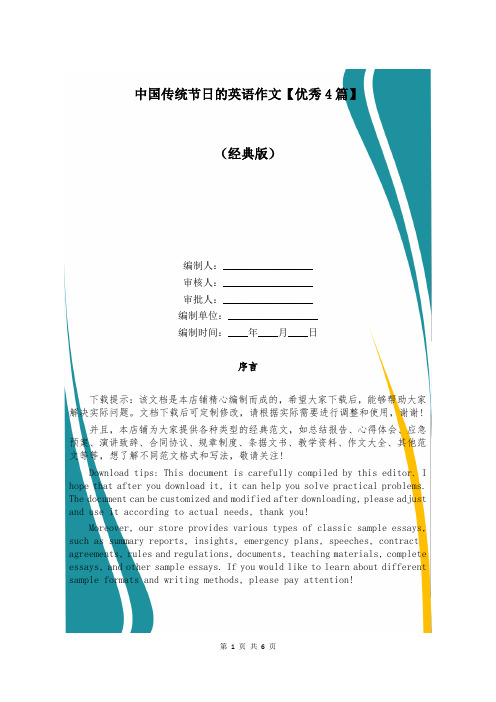
中国传统节日的英语作文【优秀4篇】(经典版)编制人:__________________审核人:__________________审批人:__________________编制单位:__________________编制时间:____年____月____日序言下载提示:该文档是本店铺精心编制而成的,希望大家下载后,能够帮助大家解决实际问题。
文档下载后可定制修改,请根据实际需要进行调整和使用,谢谢!并且,本店铺为大家提供各种类型的经典范文,如总结报告、心得体会、应急预案、演讲致辞、合同协议、规章制度、条据文书、教学资料、作文大全、其他范文等等,想了解不同范文格式和写法,敬请关注!Download tips: This document is carefully compiled by this editor. I hope that after you download it, it can help you solve practical problems. The document can be customized and modified after downloading, please adjust and use it according to actual needs, thank you!Moreover, our store provides various types of classic sample essays, such as summary reports, insights, emergency plans, speeches, contract agreements, rules and regulations, documents, teaching materials, complete essays, and other sample essays. If you would like to learn about different sample formats and writing methods, please pay attention!中国传统节日的英语作文【优秀4篇】根据中文大意和英语提示词语,写出意思连贯、符合逻辑、不少于60词的短文。
中国传统节日英文
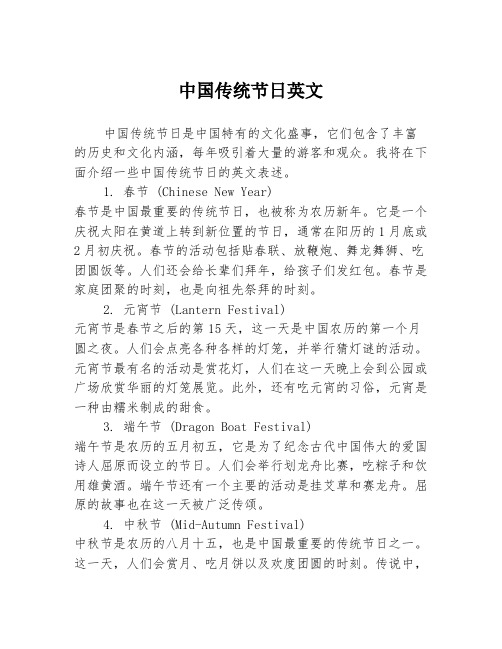
中国传统节日英文中国传统节日是中国特有的文化盛事,它们包含了丰富的历史和文化内涵,每年吸引着大量的游客和观众。
我将在下面介绍一些中国传统节日的英文表述。
1. 春节 (Chinese New Year)春节是中国最重要的传统节日,也被称为农历新年。
它是一个庆祝太阳在黄道上转到新位置的节日,通常在阳历的1月底或2月初庆祝。
春节的活动包括贴春联、放鞭炮、舞龙舞狮、吃团圆饭等。
人们还会给长辈们拜年,给孩子们发红包。
春节是家庭团聚的时刻,也是向祖先祭拜的时刻。
2. 元宵节 (Lantern Festival)元宵节是春节之后的第15天,这一天是中国农历的第一个月圆之夜。
人们会点亮各种各样的灯笼,并举行猜灯谜的活动。
元宵节最有名的活动是赏花灯,人们在这一天晚上会到公园或广场欣赏华丽的灯笼展览。
此外,还有吃元宵的习俗,元宵是一种由糯米制成的甜食。
3. 端午节 (Dragon Boat Festival)端午节是农历的五月初五,它是为了纪念古代中国伟大的爱国诗人屈原而设立的节日。
人们会举行划龙舟比赛,吃粽子和饮用雄黄酒。
端午节还有一个主要的活动是挂艾草和赛龙舟。
屈原的故事也在这一天被广泛传颂。
4. 中秋节 (Mid-Autumn Festival)中秋节是农历的八月十五,也是中国最重要的传统节日之一。
这一天,人们会赏月、吃月饼以及欢度团圆的时刻。
传说中,嫦娥是一个女神,她嫁给了后羿,并居住在月宫里。
人们在中秋节的晚上会仰望明月,怀念家人和亲朋好友。
5. 清明节 (Tomb-sweeping Day)清明节是中国传统的祭祖节日,通常在阳历4月4日至6日之间。
这一天,人们会打扫和修缮祖先们的坟墓,并向他们献上食物和鲜花。
此外,还有一些寺庙会举行扫墓祭拜的仪式,人们可以燃香祈福。
以上是一些中国传统节日的英文介绍。
这些节日不仅代表了中国的文化和历史,也是中国人民传承的重要价值观和习俗。
无论是中国人还是外国人,都可以通过参与这些节日来更好地了解中国的文化。
中国传统节日英文介绍
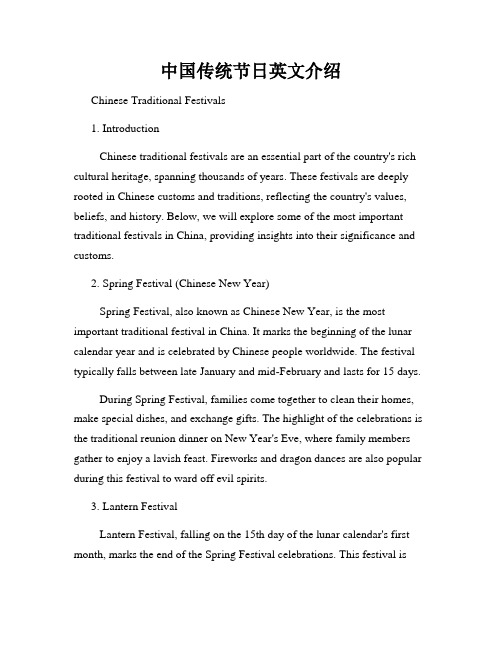
中国传统节日英文介绍Chinese Traditional Festivals1. IntroductionChinese traditional festivals are an essential part of the country's rich cultural heritage, spanning thousands of years. These festivals are deeply rooted in Chinese customs and traditions, reflecting the country's values, beliefs, and history. Below, we will explore some of the most important traditional festivals in China, providing insights into their significance and customs.2. Spring Festival (Chinese New Year)Spring Festival, also known as Chinese New Year, is the most important traditional festival in China. It marks the beginning of the lunar calendar year and is celebrated by Chinese people worldwide. The festival typically falls between late January and mid-February and lasts for 15 days.During Spring Festival, families come together to clean their homes, make special dishes, and exchange gifts. The highlight of the celebrations is the traditional reunion dinner on New Year's Eve, where family members gather to enjoy a lavish feast. Fireworks and dragon dances are also popular during this festival to ward off evil spirits.3. Lantern FestivalLantern Festival, falling on the 15th day of the lunar calendar's first month, marks the end of the Spring Festival celebrations. This festival ischaracterized by the display of colorful lanterns and various cultural activities.People often write riddles on their lanterns for others to solve, adding an element of fun and intellectual challenge to the festival. The iconic lanterns take many forms, including those shaped like animals, flowers, or famous landmarks. Watching the lanterns light up the night sky is a mesmerizing experience.4. Dragon Boat FestivalThe Dragon Boat Festival, also known as Duanwu Festival, is celebrated on the fifth day of the fifth lunar month. This festival commemorates the famous poet Qu Yuan and is characterized by the exciting racing of dragon boats.Dragon boat races involve teams of rowers paddling vigorously to the beat of a drum, competing to reach the finish line first. These races attract huge crowds of spectators who cheer and encourage the participants. Another significant tradition of this festival is the consumption of sticky rice dumplings called zongzi, which are wrapped in bamboo leaves.5. Mid-Autumn FestivalThe Mid-Autumn Festival, also known as the Moon Festival, is celebrated on the 15th day of the eighth lunar month. This festival is a time for family reunions and the appreciation of the full moon's beauty.The festival is closely associated with the legend of Chang'e, a celestial being who resides on the moon. During this festival, people gather to enjoy mooncakes, round pastries filled with various sweet or savory fillings.Lanterns in the shape of the moon are also prevalent during this festival, adding to the festive atmosphere.6. ConclusionChinese traditional festivals are not only grand celebrations but also an embodiment of the Chinese people's cultural identity and historical roots. Through these festivals, people reaffirm their bonds with family, pay respects to ancestors, and pass down customs and traditions to future generations.As China continues to modernize, it remains essential to preserve and cherish these traditional festivals as they play a vital role in maintaining cultural cohesion and fostering a sense of national unity. By understanding and appreciating these festivals, one can gain a deeper insight into the rich cultural tapestry of China.。
英文版传统节日介绍
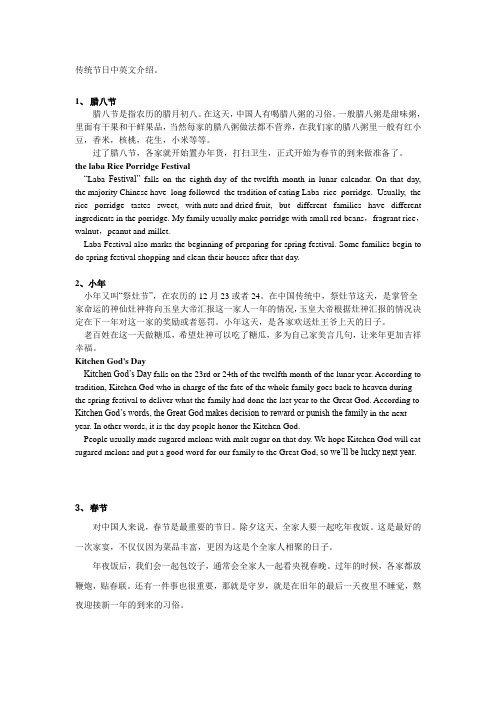
传统节日中英文介绍。
1、腊八节腊八节是指农历的腊月初八。
在这天,中国人有喝腊八粥的习俗。
一般腊八粥是甜味粥,里面有干果和干鲜果品,当然每家的腊八粥做法都不营养,在我们家的腊八粥里一般有红小豆,香米,核桃,花生,小米等等。
过了腊八节,各家就开始置办年货,打扫卫生,正式开始为春节的到来做准备了。
the laba Rice Porridge Festival“Laba Festival” falls on the eighth day of the twelfth month in lunar calendar. On that day, the majority Chinese have long followed the tradition of eating Laba rice porridge. Usually, the rice porridge tastes sweet, with nuts and dried fruit, but different families have different ingredients in the porridge. My family usually make porridge with small red beans,fragrant rice,walnut,peanut and millet.Laba Festival also marks the beginning of preparing for spring festival. Some families begin to do spring festival shopping and clean their houses after that day.2、小年小年又叫“祭灶节”,在农历的12月23或者24。
在中国传统中,祭灶节这天,是掌管全家命运的神仙灶神将向玉皇大帝汇报这一家人一年的情况,玉皇大帝根据灶神汇报的情况决定在下一年对这一家的奖励或者惩罚。
中国7个传统节日英文作文

中国7个传统节日英文作文英文:Chinese traditional festivals are an important part of the country's culture and they are celebrated with great enthusiasm and joy. There are seven major traditional festivals in China, each with its own unique customs and traditions. Let me introduce them to you one by one.The first festival is the Spring Festival, also known as Chinese New Year. It is the most important and widely celebrated festival in China. People clean their houses, decorate them with red lanterns and couplets, and set off firecrackers to welcome the new year. Families gather for a reunion dinner on New Year's Eve and children receive red envelopes filled with money. It is a time for family, food, and fireworks.The second festival is the Lantern Festival, which marks the end of the Chinese New Year celebrations. Peoplehang up colorful lanterns, eat tangyuan (sweet rice balls), and watch lion and dragon dances. It is a time for making wishes and enjoying the beauty of the lanterns.The third festival is the Qingming Festival, also known as Tomb-Sweeping Day. It is a time for people to visit the graves of their ancestors, clean the tombs, and offer sacrifices. It is also a time for outdoor activities such as flying kites and having picnics.The fourth festival is the Dragon Boat Festival, which commemorates the death of the poet Qu Yuan. People eat zongzi (sticky rice dumplings), race dragon boats, and hang up aromatic sachets to ward off evil spirits. It is a time for commemorating a great poet and enjoying the excitement of the dragon boat races.The fifth festival is the Mid-Autumn Festival, also known as the Moon Festival. People eat mooncakes, appreciate the full moon, and spend time with their families. It is a time for expressing love and longing for distant loved ones.The sixth festival is the Double Ninth Festival, also known as Chongyang Festival. People climb mountains, drink chrysanthemum wine, and wear zhuyu (a plant believed to have the power to dispel evil). It is a time for showing respect for the elderly and enjoying the beauty of autumn.The seventh festival is the Winter Solstice Festival, which marks the shortest day of the year. People eat tangyuan, take a hot bath, and stay up late to welcome the arrival of longer days. It is a time for nourishing the body and looking forward to the coming spring.中文:中国的传统节日是中国文化重要的组成部分,每个节日都有着独特的习俗和传统。
中国传统节日介绍英文版

国家或国际节日元旦New Year' s Day Jan.1国际劳动妇女节International Working women' s Day(wornen's Day) Mar.8国际劳动节nternatlonal Labor Day(May. Day)May.1中国青年节Chinese Youth Day May.4国际儿童节International Children's Day(Children's Day)June .1中国共产党诞生纪念日( 党的生日)Anniversary of the Foundlng of the ChineseCommunist Party ( the Party' s Birthday)July .1建军节Army Day August .1教师节Teachers ,Day Sept.1国庆节National Dey October.1中国传统节日春节the Sprlng Festival (NewYearls Day of the Chinese lunar calendar)农历正月初一元宵节(灯节) the Lantern Festival 农历正月十五清明节the Qing Ming Festival 四月五日前后端午节the Dragon-Boat Festiva 农历五月初五中秋节the MidAutumn Festival(the Moon Festival)农历八月十五重阳节the Double Ninth Festival 农历九月初九元旦(1月1日)NewYear'sDay春节(农历一月一日)theSpringFestival元宵节(农历一月十五日)theLanternFestival国际劳动妇女节(3月8日)InternationalWorkingWomen'sDay植树节(3月12日)ArborDay邮政节(3月20日)PostalDay世界气象节(3月23日)WorldMeteorologyDay清明节(4月5日)ChingMingFestival;Tomb-sweepingFestival国际劳动节(5月1日)InternationalLabourDay中国青年节(5月4日)ChineseYouthDay护士节(5月12日)Nurses'Festival端午节(农历五月初五)theDragonBoatFestival国际儿童节(6月1日)InternationalChildren'sDay中国共产党成立纪念日(7月1日)theParty'sBirthday建军节(8月1日)theArmy'sDay中秋节(农历八月十五)Mid-autumn(Moon)Festival教师节(9月10日)Teachers'Day重阳节(农历九月九日)Double-ninthDay国庆节(10月1日)NationalDay除夕(农历十二月三十日)NewYear'sEve阳历节日1月1日元旦(New Year's Day)2月2日世界湿地日(World Wetlands Day)2月14日情人节(Valentine's Day)3月3日全国爱耳日3月5日青年志愿者服务日3月8日国际妇女节(International Women' Day)3月9日保护母亲河日3月12日中国植树节(China Arbor Day)3月14日白色情人节(White Day)3月14日国际警察日(International Policemen' Day)3月15日世界消费者权益日(World Consumer Right Day)3月21日世界森林日(World Forest Day)3月21日世界睡眠日(World Sleep Day)3月22日世界水日(World Water Day)3月23日世界气象日(World Meteorological Day)3月24日世界防治结核病日(World Tuberculosis Day)4月1日愚人节(April Fools' Day)4月5日清明节(Tomb-sweeping Day)4月7日世界卫生日(World Health Day)4月22日世界地球日(World Earth Day)4月26日世界知识产权日(World Intellectual Property Day)5月1日国际劳动节(International Labour Day)5月3日世界哮喘日(World Asthma Day)5月4日中国青年节(Chinese Youth Day)5月8日世界红十字日(World Red-Cross Day)5月12日国际护士节(International Nurse Day)5月15日国际家庭日(International Family Day)5月17日世界电信日(World Telecommunications Day)5月20日全国学生营养日5月23日国际牛奶日(International Milk Day)5月31日世界无烟日(World No-Smoking Day)6月1日国际儿童节(International Children's Day)6月5日世界环境日(International Environment Day)6月6日全国爱眼日6月17日世界防治荒漠化和干旱日(World Day to combat desertification)6月23日国际奥林匹克日(International Olympic Day)6月25日全国土地日6月26日国际禁毒日(International Day Against Drug Abuse and Illicit Trafficking)7月1日中国共产党诞生日(Anniversary of the Founding of the Chinese Communist Party) 7月1日国际建筑日(International Architecture Day)7月7日中国人民抗日战争纪念日7月11日世界人口日(World Population Day)8月1日中国人民解放军建军节(Army Day)8月12日国际青年节(International Youth Day)9月8日国际扫盲日(International Anti-illiteracy Day)9月10日中国教师节(Teacher's Day)9月16日中国脑健康日9月16日国际臭氧层保护日(International Day for the Preservation of the Ozone Layer) 9月20日全国爱牙日9月21日世界停火日(World Cease-fire Day)9月27日世界旅游日(World Tourism Day)10月1日中华人民共和国国庆节(National Day)10月1日国际音乐日(International Music Day)10月1日国际老年人日(International Day of Older Persons)10月4日世界动物日(World Animal Day)10月5日世界教师日(World Teachers' Day)(联合国教科文组织确立)10月8日全国高血压日10月9日世界邮政日(World Post Day)10月10日世界精神卫生日(World Mental Health Day)10月14日世界标准日(World Standards Day)10月15日国际盲人节(International Day of the Blind)10月15日世界农村妇女日(World Rural Women's Day)10月16日世界粮食日(World Food Day)10月17日国际消除贫困日(International Day for the Eradication of Poverty)10月24日联合国日(United Nations Day)10月24日世界发展新闻日(World Development Information Day)10月28日中国男性健康日10月29日国际生物多样性日(International Biodiversity Day)10月31日万圣节(Halloween)11月8日中国记者节11月9日消防宣传日11月14日世界糖尿病日(World Diabetes Day)11月17日国际大学生节11月25日国际消除对妇女的暴力日(International Day For the elimination of Violence agai nst Women)12月1日世界爱滋病日(World AIDS Day)12月3日世界残疾人日(World Disabled Day)12月4日全国法制宣传日12月9日世界足球日(World Football Day)12月25日圣诞节(Christmas Day)12月29日国际生物多样性日(International Biological Diversity Day)1月最后一个星期日国际麻风节3月最后一个完整周的星期一中小学生安全教育日春分月圆后的第一个星期日复活节(Easter Monday)(有可能是3月22-4月25日间的任一天) 5月第二个星期日母亲节(Mother's Day)5月第三个星期日全国助残日6月第三个星期日父亲节(Father's Day)9月第三个星期二国际和平日(International Peace Day)9月第三个星期六全国国防教育日9月第四个星期日国际聋人节(International Day of the Deaf)10月的第一个星期一世界住房日(World Habitat Day)10月的第二个星斯一加拿大感恩节(Thanksgiving Day)10月第二个星期三国际减轻自然灾害日(International Day for Natural Disaster Reduction) 10月第二个星期四世界爱眼日(World Sight Day)11月最后一个星期四美国感恩节(Thanksgiving Day)农历节日农历正月初一春节(the Spring Festival)农历正月十五元宵节(Lantern Festival)农历五月初五端午节(the Dragon-Boat Festival)农历七月初七乞巧节(中国情人节)(Double-Seventh Day)农历八月十五中秋节(the Mid-Autumn Festival)农历九月初九重阳节(the Double Ninth Festival)农历腊月初八腊八节(the laba Rice Porridge Festival)农历腊月二十四传统扫房日。
- 1、下载文档前请自行甄别文档内容的完整性,平台不提供额外的编辑、内容补充、找答案等附加服务。
- 2、"仅部分预览"的文档,不可在线预览部分如存在完整性等问题,可反馈申请退款(可完整预览的文档不适用该条件!)。
- 3、如文档侵犯您的权益,请联系客服反馈,我们会尽快为您处理(人工客服工作时间:9:00-18:30)。
Qing Ming
Du Mu( Tang Dynasty )
Qing Ming usually comes with rainy days
பைடு நூலகம்
清明时节雨纷纷, 路上行人欲断魂, 借问酒家何处有, 牧童遥指杏花村.
I ask a Buffalo boy for tavern ['tævən] to release my sadness Passengers on the way are full of soreness
He points to the village covered by apricot ['eiprikɔt] blossoms
Chinese Valentine’s Day
The seventh day of the seventh month of the lunar calendar is known as Qi Xi Jie or Qiqiao Jie, a traditional holiday that has been recently called China's Valentine's Day.
In China, the most traditional and popular Spring Festival food is dumpling, which looks like the moon with vegetables and meat mixed in it. The Chinese name of dumpling is “JIAO ZI”, ”JIAO” means ”cross”, ”ZI” is Chinese traditional time represents “24:00”, so the Chinese word “JIAO ZI” means “cross 24:00”, just the dividing point of last year and next year. So when it comes to 24:00, every family begins eating dumplings.
Spring Festival is also the happiest time for children, because they can get red envelope containing money as a gift from the elder. During the Spring Festival, any unfortunate word cannot be heard because it will make people upset and unhappy. People also make use of this holiday to visit their relatives and bring them some presents and well-wishing.
One most famous story is Chang’e flying to the moon.
Thousands of years ago, there were 9 suns in the sky. Many people felt too hot to live. A young man called Yi was brave enough and shot 8 suns to the ground and saved people. One day Yi got a potion of elixir [i‘liksə](长生不老药) from Queen Mother and gave his wife Chang’e to keep. A man named Peng Meng knew about the elixir and wanted to get it from Chang’e. One day when Yi was out for hunting, Peng Meng went to rob the elixir. In order to protect the elixir, Chang’e swallowed all of the elixir ,and then flied to the moon.
The Lantern Festival
(元宵节)
The Lantern Festival is January 15 on the lunar calendar. The lunar January is the first month of a year and 15th is the first day of full moon. During Lantern Festival, people go along the street to watch lanterns and children light their own small lanterns for some fun. The biggest and most beautiful lantern is the dragon lantern, which looks like a flying dragon, held by several young guys. One with a ball in hand leads the dragon to move.
Tomb-
清明节) sweeping Day(清明节)
Tomb–sweep Day is an ancient festival in spring, also called Qing Ming Festival. In ancient China, the emperor worshipped heaven and earth in order to bless for harvest. People worshipped their ancestors with sacrifice and showed their missing for ancestors.
Now putting up red paper on the door and setting firecracker becomes Spring Festival customs and people believe doing these will bring their family safety.
Mid-Autumn Day
(中秋节)
Mid-autumn Day is August 15th on lunar calendar. According to history records, Chinese emperor has tradition that worship the Sun in spring and worship the Moon in autumn. As August 15th is exactly the middle of autumn, so it is called Mid-Autumn Day. The traditional food of Mid-Autumn Day is Moon cake, a round baked cake with fillings in it. The round shape of moon cake represents family reunion. In the night of Mid-Autumn Day, every family has moon cake and watches the moon.
Spring Festival
The Spring Festival is known as the most important festival in China. During the holiday, people go back to hometown from everywhere no matter how far the distance is. They prepare various delicious food and presents for the Spring Festival Eve. Chinese will have a happy family union in the Spring Festival Eve, they believe that’s the end day of last year and they will stay up for good luck until the first day of next year.
Legend
The 2,000-plus-year-old holiday marks the star-crossed love between a cow herder Niulang and Zhinu, a weaver of clouds and the daughter of the Jade Emperor who is the Daoist ruler of heaven. The story goes that the two fell in love and got married, but their bond was met with disapproval by Wangmu, Zhinu's mother and the queen of heaven. Niulang is viewed as the star Altair and Zhinu as the star Vega. With a swift move of her hairpin, she separated the two with a river in the sky, known today as the Milky Way. But the queen took pity on them and gave them one night of the year to spend together. On Qi Xi Jie, the queen is said to send magpies to bridge the celestial [si'lestjəl] gap between the two star lovers.
